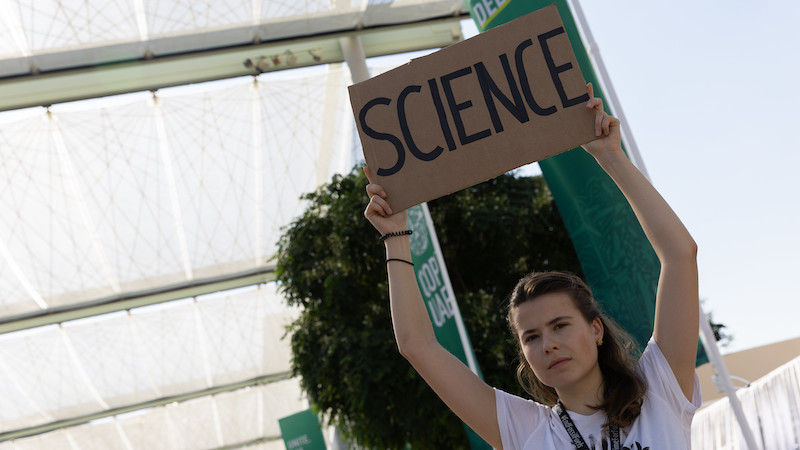“Science has guided my life”, Sultan Al Jaber hit back after being accused of denying the scientific consensus that a massive cut-back on fossil fuels is needed to prevent devastating climate impacts.
Striking a firm, and at times exasperated, tone, the oil executive-turned-Cop28 president slammed press reports as “misrepresentations”, the result of “statements taken out of context”.
Al Jaber insisted he had said “over and over that the phase-down and phase out of fossil fuels is inevitable”. But, “how come does this never get picked up [by the media]?” he asked, appearing to have taken the criticism personally.
To reinforce his pro-science credentials, Al Jaber came to the press conference with Jim Skea, chair of the Intergovernmental Panel on Climate Change.
To nods from the Cop28 president, Skea said that in 1.5C-compatible scenarios “by 2050, fossil fuel use is greatly reduced and unabated coal use is completely phased out.” He added that oil use by 2050 is reduced by 60% and gas by 45%. Al Jaber, Skea said, was “attentive to the science” and “fully understood it”.
The latest headlines
- Don’t be fooled: CCS is no solution to oil and gas emissions – Laurence Tubiana and Emmanuel Guerin, European Climate Foundation
- Vietnam charts uncertain coal path as finance falls short
- US tees up Congress battle with $3bn Green Climate Fund pledge
Event: Reading the politics
At 18:00 Dubai time today, Tuesday 5 December, Climate Home News will review the first week of Cop28 with special guests Vanessa Nakate, Bernice Lee and Harjeet Singh.
Register to watch live on Zoom and submit written questions to the panel.
‘The mother of all cover decisions’
As Cop28 enters the deep negotiations phase, anxiety is kicking in. Work on the crucial global stocktake text proceeds at snail’s pace. This is expected to be the main outcome of the summit, or as lead EU negotiator Jacob Werksman put it, “the mother of all cover decisions”.
It took three days to complete the first read-through of a document that is littered with multiple options and placeholders on every contentious issue.
“We are behind in the negotiating process,” said Madeleine Diouf Sarr, chair of the least developed countries.
Negotiators spent a big chunk of Monday huddled in informal talks trying to chart a path forward. The goal is to hand ministers, landing in Dubai in a couple of days, something easier to work with than a long list of open questions. At time of writing, a new text was expected by Tuesday morning.
The atmosphere is “positive”, three observers told Climate Home, but divisions remain on fundamental issues: the energy package, climate finance and the guidelines for the next round of national climate plans (NDCs).
To some extent, negotiators have got themselves to blame for the long nights ahead. Last June, an extended fight over the agenda in Bonn hindered progress, leaving all the painstaking work to Dubai.
“The fundamental challenge is that we came into Cop28 without a formal negotiating text,” Kaveh Guilanpour, a former lead negotiator for the EU and UK, told Climate Home. “After Bonn, all we had was unagreed headings, and no substantive discussions.”
Banga dismisses fear of the World Bank
One of the biggest concessions developing countries made to get a loss and damage fund up and running was agreeing to let the World Bank initially host it.
Developing countries expressed strong concerns about US dominance of the Bank’s culture and limits that placed on the new fund’s autonomy.
When Climate Home News nabbed president Ajay Banga for a quick interview after a side event, he dismissed such fears as a “misunderstanding”.
“That position is based on the idea that somehow the World Bank will control how that money is put out to work. That’s not the method, which is why they approved it. We’re only a trustee,” Banga said.
“I don’t know where the misunderstanding came from that we somehow will be deciding how the money is used,” he added.
While the World Bank will not dictate funding decisions, the fund’s staff will be Bank employees, which could influence work culture, said Liane Schalatek, Associate Director of the Heinrich-Böll-Stiftung. World Bank staff could also be seconded to the loss and damage fund.
Michai Robertson, a climate finance negotiator for small island states, remained wary. The “biggest obstacle” for the not-yet-elected board will be negotiating against the World Bank’s policies, he said in a press conference.
“This institution will need to, as its president has highlighted that it’s ready to reform, will need to change,” Robertson said.
In brief
More important things – While dozens of world leaders spoke at Cop28, others stayed away. China’s Xi Jinping was inspecting the coast guard, Canada’s Justin Trudeau was eating Chinese food and campaigning in Ontario, Australia’s Anthony Albanese was calling in to talk radio show in Melbourne and we don’t know what the US’s Joe Biden was doing.
$57bn ‘mobilised’ – The Cop28 presidency claims to have mobilised over $57 billion so far “in new pledges and commitments”. This includes its own $30 billion Alterra Fund and the US’s $3 billion pledge to the Green Climate Fund. We’re working on a full breakdown.
Hero to fossil – Last year, Brazil’s president Lula got a rock star reception from civil society at Cop27. Today, his Brazilian government was awarded the Fossil of the Day award by campaigners after it moved closer to the OPEC+ group of oil producers.
Emissions up – Global CO2 emissions from fossil fuels are expected to grow 1.1% in 2023, new research from the Cicero finds. Emissions have grown on average 0.5% a year over the last ten years. Separate research finds 2023 is likely to be the peak.

